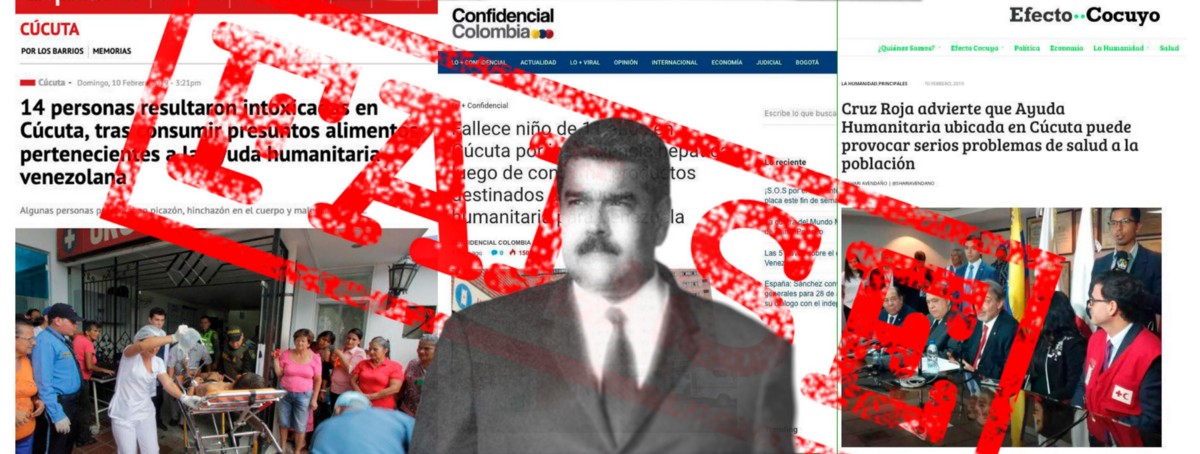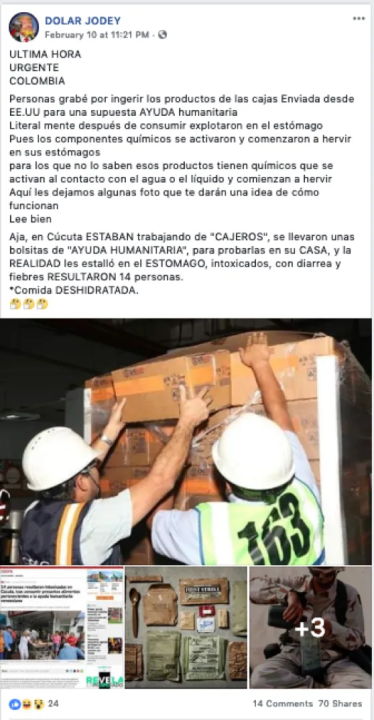Maduro Repeats Twitter Hoax About U.S. Aid in Televised Speech
Regime leader repeated the false claim after pro-Maduro Twitter accounts spread forged screenshots about United States aid to Venezuela
Maduro Repeats Twitter Hoax About U.S. Aid in Televised Speech

BANNER: (Source: @noalsilencio/DFRLab via Eneas de Troya, front; @SUKOICRIOLLO, background)
In a speech on February 23, Venezuelan regime leader Nicolás Maduro falsely claimed that the food aid the United States sent to his country was contaminated. “Two people already died from eating it- there are a hundred people with food poisoning,” he said from a stand in Caracas. “It is carcinogenic, rotten food.”
These unsubstantiated claims are part of a disinformation campaign ignited by regime supporters on Twitter profiles and Facebook pages and spread by high-profile officials in public speeches. The claims are based on unverified evidence and falsified media coverage. Their likely aim is discrediting the aid effort and instilling fear in the Venezuelan people of consuming the food aid, if it ever makes it to the country.
Self-declared Interim President Juan Guaidó set a deadline on February 23 for delivering 600 tons of “humanitarian aid” from the United States and other countries to Venezuela. That day, the attempts to deliver the aid were met with resistance from Venezuelan armed forces at the borders with Colombia, Brazil, and Curacao, resulting in at least seven casualties. The aid did not enter the country, and, as no new attempts to send it through the Venezuelan borders have been made, it now languishes in warehouses near the border.
Unknown Source
On February 10, a piece appeared on the website of Venezolana de Televisión (VTV), a state-owned TV network, claiming that a study “developed by” the U.S. National Center for Biotechnology Information (NCBI) stated that “the companies that manufacture food sent as humanitarian aid, similar to the aid the United States has sent to the [Venezuelan] border with Colombia, use preservatives that are harmful to health.” The piece was widely republished across government websites.
The report cites a supposed NCBI research report that indicated that food and drinks that are part of the aid effort include chemicals such as sulfur dioxide and acrylamide, which they allege cause health effects such as cancer, rashes, or asthma attacks. It also says aid food exceeds the daily requirements of sugar. The VTV piece does not mention the title of the research papers it claims to have quoted, nor the source of the information on the aid’s ingredients and nutritional value.
A search on the NCBI’s website for the terms “sulfur dioxide,” “acrylamide,” “sugar,” and “aid” combined only returns three books — one on guidelines for assessing food policies, one on guidelines for measuring drinking water quality, one on the carcinogenic effects of alcohol — and two research papers — one on occupational health risks and another on the compounds that afford goat and lamb meat their flavors. “We do not know of any study, publication, or article authored by NCBI on this topic,” the Center said in a statement after the DFRLab reached out for comment.
Despite the lack of clarity on the sourcing of these claims, Maduro’s Vice President Delcy Rodriguez said in a televised speech on February 13 that the food aid from the United States “is contaminated and poisoned,” “carcinogenic,” and part of a U.S. plan “to poison our [Venezuelan] population with chemicals.” Maduro repeated the same claims twice: first on February 20 and again in his February 23 speech.
Fake Screenshots
Starting on February 10, pro-regime Twitter accounts, including @GipsyGastello and @SUKOICRIOLLO, spread a false screenshot from the Colombian newspaper La Opinión that claims that 14 people fell ill in the border city of Cúcuta after consuming food from the U.S. aid package.
@SUKOICRIOLLO also shared false screenshots from TV station NTN24 and Venezuelan news website Efecto Cocuyo that quoted the International Red Cross as stating that the U.S. food did not pass food safety controls and should not be eaten.

Both La Opinión and Efecto Cocuyo denied the pieces came from their websites. Efecto Cocuyo pointed out that the picture on the forged screenshot first appeared on a piece about the press conference with the International Committee of the Red Cross, at which they announced their decision not to participate in aid delivery because of their policy of remaining politically neutral.
Both tweets were popular. @SUKOICRIOLLO’s tweet was retweeted 690 times, had 9.2 million impressions, and reached 25,600 users, according to Sysomos. @GipsyGastello’s tweet was seen by 46,000 people and had 6.5 million impressions. An analysis of the retweeters’ biographies show most of them were Maduro supporters: they described themselves with words such as “Chavista,” “bolivariano” (Bolivarian), or “antiimperialista” (anti-imperialist).

These false screenshots and the claims they support have been amplified by several Facebook accounts. For instance, the pro-regime page Dolar Jodey posted it in two different posts, adding a text before copying @SUKOICRIOLLO’s tweet. The most popular one was shared 70 times.

In spite of the rebuttals, @SUKOICRIOLLO doubled down on his lies on February 21. On a tweet, he claimed that three people died after consuming the food. Other influential pro-regime Twitter users, including @FBuenAbad (3,200 retweets), @RebeldeRed4F (316 retweets), and @Yankee_Latina (455 retweets), also claimed that people in Cúcuta died after eating the aid food.
Two of them also shared forged screenshots from different Colombian media outlets. Confidencial Colombia, one of these outlets, denied having published the posted piece. Both pieces in the screenshots claim that the cause of death was liver failure after consuming the food, and both headlines feature the expression “consumir productos destinados a la ayuda humanitaria para Venezuela” (to consume products from the humanitarian aid for Venezuela), a wordy phrase unlikely to be found in a short online news headline.

Conclusion
Regime leader Nicolás Maduro and other top Venezuelan regime officials have been amplifying the false claim that Venezuela-bound aid coming from the United States has killed people in Cúcuta, a Colombian border city where part of the aid is stored. This hoax was based on unconfirmed reports quoted by state media and on forged news media screenshots that have been confirmed as false. The false claim is being spread with the likely aim of discrediting the efforts of self-declared Interim President Juan Guaidó to direct food and medicines to the country.
The spread of this conspiracy theory suggests a link between sectors of the government and social media users who repeat pro-regime propaganda, a phenomenon the DFRLab has documented before. Furthermore, this is another symptom of the dire state of the information ecosystem in the country and is evidence of the weaponization of disinformation amid the political and humanitarian crisis in the country.
Follow along for more in-depth analysis from our #DigitalSherlocks.

